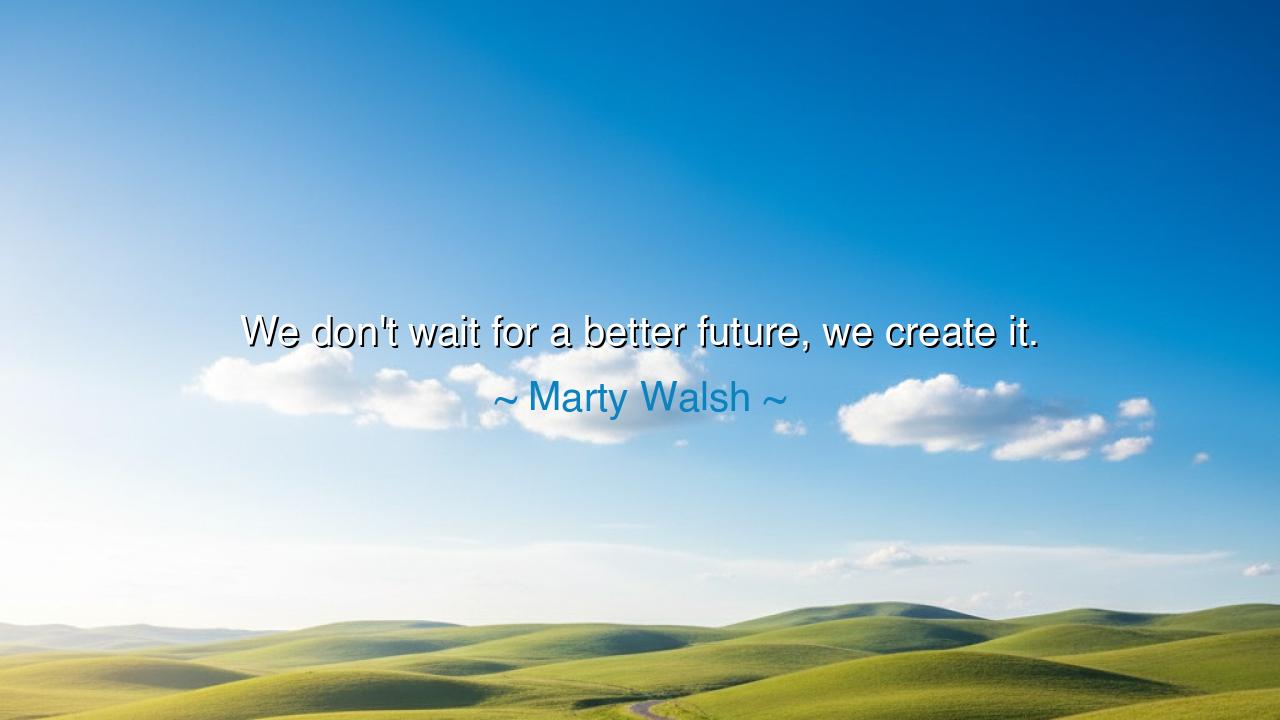
We don't wait for a better future, we create it.






"We don't wait for a better future, we create it." These words spoken by Marty Walsh are a call to action, a profound reminder that the future is not something we passively await, but something we must actively forge with our own hands. Walsh’s statement embodies the spirit of agency, urging us to take responsibility for the world we want to build, rather than waiting for change to come from external forces. In a world often filled with uncertainty, it is easy to fall into the trap of waiting for the perfect conditions or the arrival of a better time. But Walsh emphasizes that true progress comes not from waiting, but from creating—from working towards a future of our own making.
In the ancient world, the concept of destiny was often tied to the belief that the gods controlled the fate of humankind. The Greeks, for example, spoke of the Fates, three sisters who spun the threads of life, determining the paths of all people. Yet, even within this belief, there was room for human action. Heracles, one of the most famous Greek heroes, was fated to face many trials, but he actively shaped his destiny through his strength, courage, and perseverance. Heracles did not sit idly by, waiting for fate to unfold; instead, he took action, transforming his trials into triumphs. Similarly, Marty Walsh’s words echo this idea: we are not bound by fate, but by our ability to act and create the future we desire.
Consider the story of Thomas Edison, who, through sheer will and determination, created the future he envisioned. Edison did not wait for the world to give him the tools he needed; he invented them. When faced with skepticism and failure, Edison famously said, "I have not failed. I’ve just found 10,000 ways that won’t work." His relentless pursuit of progress, his refusal to accept defeat, is a shining example of Walsh’s belief that the future is created through determined action. Edison’s inventions—the lightbulb, the phonograph, and countless others—did not simply appear by chance; they were the result of deliberate effort and a steadfast belief that the future could be bettered through innovation.
Similarly, the civil rights movement in the United States provides a powerful example of people actively creating a better future. Leaders like Martin Luther King Jr., Rosa Parks, and Malcolm X did not sit back and wait for society to change; they fought for justice, equality, and the rights of African Americans, knowing that the future could only be changed through action. King’s famous March on Washington and his words, "I have a dream," were not passive appeals for change but calls to create a future where racial justice prevailed. The future of the civil rights movement was not something that would come on its own—it had to be fought for, step by step, in the face of immense challenges and resistance.
In ancient Rome, the idea of creating one’s destiny was also evident in the story of Cicero, the great philosopher and orator. Cicero’s political career was filled with trials and obstacles, yet he believed in the power of rhetoric and reasoning to shape the future. He did not wait for the political system to change around him; he used his voice, his intelligence, and his influence to actively fight for a more just and rational society. His speeches and writings shaped the course of Roman politics, demonstrating that one could create the future through the power of words and ideas.
The lesson from both ancient history and Marty Walsh’s words is profound: the future is not something we passively await, but something we actively shape. To create a better future requires action, vision, and dedication. We are not victims of circumstance; we are the architects of the world we wish to see. Whether in personal development, social progress, or global change, we must choose to be proactive in creating the world we want for ourselves and future generations. We must recognize that change does not come from waiting but from the courage to act, the wisdom to guide our actions, and the perseverance to see our visions through.
The actionable lesson here is to take ownership of the future by shaping it with intentional action. Whether it is through small acts of kindness, large societal efforts, or the pursuit of personal goals, we must act with conviction. We must dream big, but also commit to the hard work required to bring those dreams into reality. Just as Edison, King, and Cicero did not wait for the future to come to them, we must forge ahead, confident that our actions today can create a brighter tomorrow.
Let us take action by embracing the power of agency. Do not wait for the right time or the perfect conditions to create the future you desire. Seize the moment, make decisions with purpose, and commit to building a better future, both for yourself and for those around you. The future is ours to create—through our actions, our choices, and our collective will. Let us embrace this power, knowing that we hold the keys to the world we wish to live in.






AAdministratorAdministrator
Welcome, honored guests. Please leave a comment, we will respond soon